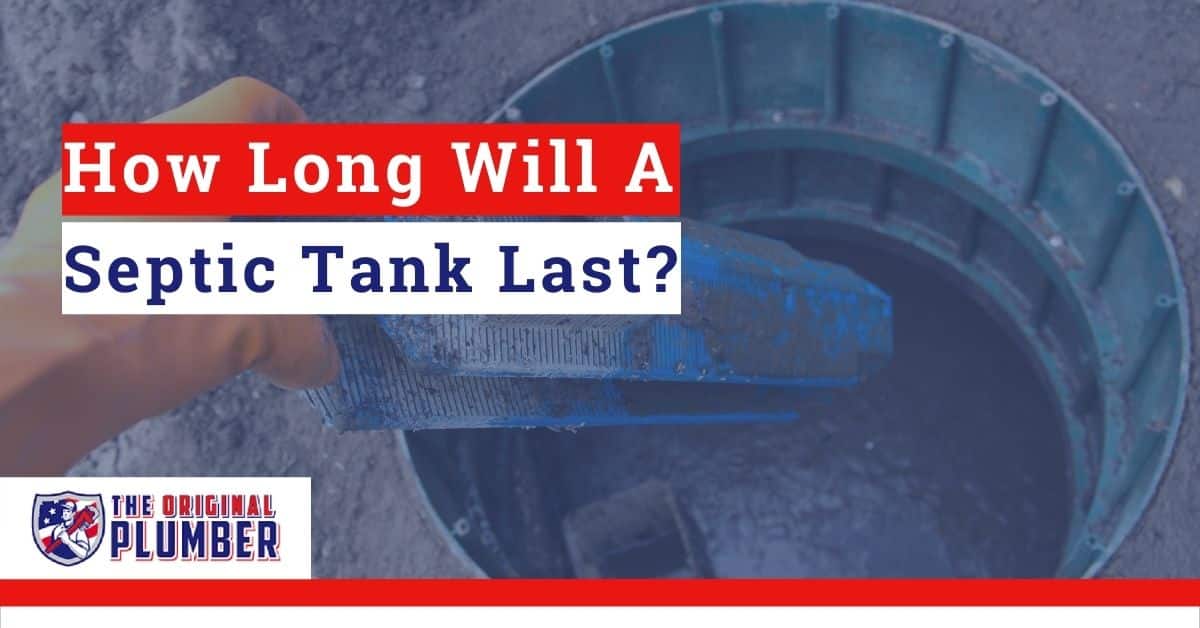If you have a septic tank, you may be wondering just how long it will last. The answer depends on a number of factors such as the age of your septic system, the condition, use, and whether or not it’s been maintained properly.
How long will a Concrete and Steel Septic Tank last?
In general, concrete septic tanks can last up to forty years, and steel septic tanks are not far behind, at around twenty to thirty years.
If you want to get the maximum useful life expectancy from your septic system, keep reading to learn what factors can negatively or positively impact your tank life.
Basics of a Septic System
Before we dive into how to extend the life of your septic tank and how to avoid system failure prematurely, let’s cover the basics of any septic system.
A septic tank is essentially an underground wastewater treatment option. It takes the wastewater from your home (from things like toilets, dishwashers, sinks, washing machines, and more) and processes it. In the tank, the solids sink to the bottom, and bacteria help dissolve the sludge so that sterile water can be released back into the environment through a drain field. The tanks can typically hold between 1,000 and 1,500 gallons.
Usually, homes with a septic tank are not connected to a centralized utility option either because they’re in more rural areas or because the connection was unavailable when the home was built. Septic tanks are a great alternative to process wastewater efficiently.
How to Maintain Your Septic System
If you want to extend the life expectancy of a septic tank, then the best thing you can do is keep it properly maintained and avoid any negative actions that might cause damage.
Below is a list of things that you can do to keep your old septic tank functioning properly and extend the septic system life.
Maintain Your Septic Tank
The first thing you can do to maintain your entire system is to maintain the tank itself. Both versions need to be maintained with regular cleanings, whether you have a concrete septic tank or steel septic tank.
On average, you should expect to get your septic tank cleaned about every three years, assuming regular use and no unexpected problems like a sewage backup or system failure. During a septic tank cleaning, a plumbing professional will empty the contents of your concrete or steel septic tank. It’s also an excellent time to inspect the entire septic system, including the septic leach field, drain field pipes, and more.
Having your tank pumped helps the septic system keep functioning correctly.
Inspect Your Leach Field
A leach field or septic drain field is where the pretreated wastewater begins the process of filtering through the soil. Pretreated wastewater runs through the drain pipes then filters through the soil before exiting as groundwater.
Regular drainfield maintenance is essential to identify drain field clogging, poor soil conditions (like high soil acidity), and broken pipes. A problem with the drain field can mean problems for your entire system, so taking the time to inspect it is a great way to extend your septic system life.
How do you know if a problem exists? Look for standing water or squishy wet ground. Foul smells can be another indicator that the drain field isn’t working or an overflow is occurring. Call a plumbing professional right away if you notice any of these signs of distress. They can inspect your leach field and help address the problem.
Protect Your Leach Field
Sometimes tanks can be mechanically damaged, made with poor construction, or simply overflow, but other times, the damage is caused by homeowners. Never drive over a drain field or park cars in the area. It’s a quick way to break pipes, damage a tank or get stuck in the wet sites!
You also shouldn’t plant trees near a drain field or septic system. The roots can go deep and get into the system, leading to damage, small cracks, and in some cases require complete replacement. Keep the area clear from these two factors and lower the risk of a failed drain field.
How Many People Are in Your Home?
Steel tanks and concrete septic tanks have a finite amount of space available. And keeping them in proper working order means you can’t overload the system.
The average family usage is fine, but when you start adding in extra people for an extended period, or excessive use, you risk overloading septic systems.
If you have a higher number of people in your home, manage your water usage and protect your septic system from being overwhelmed. If excessive use is expected to go on for an extended period of time, anticipate having your concrete septic tank emptied more frequently. The same is true for a steel tank.
Use Products That Are Safe for Septic Tanks
Just because you have a steel tank doesn’t mean it can handle everything you can throw at it. Septic tanks can easily be affected by the everyday household products we use, like bleach, antibacterial soaps, and other harsh chemicals. Once these products go down the drain, they can disrupt the healthy bacteria that live inside your septic system.
Take proper care of your system by limiting household chemicals and disposing of them another way (besides down the sink) whenever possible.
Don’t Flush Items You Shouldn’t Down the Toilet
If you live in a home with a septic tank, what you flush down the toilet (or don’t) matters to the system’s life expectancy. We all know that human waste and solid waste can go down the toilet, but baby wipes, feminine hygiene products, and even toilet paper that isn’t bio-degradable can be hard (or downright destructive) to your septic system.
Items that can’t be broken down like human waste sit at the bottom of a concrete tank and begin to fill the space. This buildup takes a toll and expedites the need for regular maintenance like pumping and cleaning the tank.
What else should you be careful sending down the drain? Coffee grounds, cigarette butts, kitty litter, and floss are other common enemies of septic systems.
Coffee grounds don’t get better if you send them down the garbage disposal. It’s actually their acidity that causes a problem. Cigarette butts can’t break down, and kitty litter absorbs water and clumps – both causing problems for a new septic system, much less one that’s older.
And what about floss? Its combination of strength and size can cause it to get wrapped around other items within a septic system leading to damage.
Why Do Septic Systems Fail
We’ve covered a few steps you can take to maintain your septic system. Now, let’s cover the reasons a system regularly fails, regardless of construction material and whether we’re talking about plastic tanks, steel tanks, or a concrete tank.
Too Much Water Use
Believe it or not, one of the main factors to a septic system that stops working properly is too much water use. As we mentioned above, steel septic tanks, plastic tanks, and a concrete septic tank all have something in common, and that is the fact that their capacity is limited. No matter the tank size, there is still a limit to how much wastewater can be processed at any given time.
A new septic tank or septic tank replacement takes into account the size of your house and the expected water use. Extra people or excessive water use can mean that the tank fills up more quickly than it can process and pump the water out of the system. The tank simply can’t take on anything more. That means what’s coming in has to go elsewhere, such as through pipes or outside the tank as an overflow.
If this is occurring, you may need to discuss your needs with a septic system expert who can make sure you have a properly designed system for your needs today.
Physical Damage
If your septic system is physically damaged, you will definitely reduce the useful lifespan. Along with the tank and drain field, there is also a pipe that connects the tank to your home and the soil around it. Damage to any of these four components can mean trouble for the entire septic system.
As we mentioned above, nearby trees are often a culprit of damage because the roots grow into the septic system itself, breaking and clogging pipes or even the tank.
Driving over the drain field, parking vehicles there, or adding paving or rocks will compact the soil and possibly break things in the process. Regardless of your drain field and soil type, it’s best to keep the area free from interference that can disrupt the pump, pipes, soil conditions, and tank.
Lack of Corrective Action
Lack of corrective action is a significant factor in septic system failure. For that reason, it’s essential to inspect your system routinely and the soil around it to look for signs that something may be off.
What are signals that your system may be in trouble? One of the common signs is a foul smell in the yard that could mean a backup is occurring.
Another thing to watch for is wet grass or standing water in the drain field areas around the tank. Even if you have a high water table, soggy soil around your system can spell trouble and is worth calling an expert to investigate your septic system.
Lastly, slow drainage in your house or backups can mean that a septic system is in trouble and that it’s time to call for system maintenance and possible repair. You can often avoid a more costly septic system problem by taking corrective action early.
Lack of Maintenance
Taking corrective action is great but conducting proper maintenance on a regular schedule is even better when it comes to septic systems. Performing routine maintenance is often the first component to maintaining a long septic system life. Not only does your system benefit from a routine inspection of the tank, pipes, soil absorption field, and more – your professional plumber can also catch early warning signs and take corrective action if needed.
Plan on pumping your tank at least every three years, during which everything from the scum layer and other solids are removed, giving your tank a fresh start. And if you notice any concerns or problems in between cleanings, give a professional a call.
Septic Tanks – Frequently Asked Questions
Want to know more? Below is a list of frequently asked questions for septic tank maintenance.
How do you know if your septic tank is bad?
Foul smells in your yard, gurgling water sounds, backups in your house, and slow drainage are all signs that your septic tank may be bad. Call a plumbing professional right away if you’re experiencing any of these problems. Don’t let a minor issue become an expensive, inconvenient emergency.
Do septic tanks ever need to be replaced?
Yes! Septic tanks do need to be replaced from time to time. With regular maintenance, tanks can usually last between thirty and forty years before needing to be replaced. But overuse, lack of proper maintenance, or damage are all reasons that you might need a tank replacement now. If you’re not sure, reach out to The Original Plumber & Septic. We’re happy to provide a free inspection that will help you determine if a new tank is necessary.
How Often Should I Pump A Septic Tank?
Depending on the size and use, you need to pump a tank about every three years or so. If you notice any of the problems we’ve covered above, or your tank hasn’t been maintained well, it may be more frequent. Call The Original Plumber & Septic for a free assessment.
Does Location Matter to Septic Tank Lifespan?
Yes, it can! A tank that is at the bottom of a hill, for example, may become flooded more frequently from water as it drains downward. The soil also matters because the more absorbent it is, the better. Soil with a high water table or coarse gravel won’t absorb as much and isn’t the best choice.
As we’ve mentioned above, a tank near trees can also dramatically decrease the lifespan of a tank because the root system can easily cause damage.
Ready to extend the life of your septic tank?
We’ve covered many practical ways to extend your septic system’s health and avoid common actions that can decrease life expectancy. In addition to the items we’ve covered, there are many other factors – like hydrogen sulfide buildup, inadequate bacteria, filters, and more that play a role in your septic system’s healthlas. If you haven’t had a professional inspection in a while, it’s time to call The Original Plumber & Septic.
Our professional technicians are trained to handle septic systems throughout the North Metro Atlanta area and surrounding areas. We serve both commercial and residential customers. Call us to learn more about how we can help you or request your free assessment!





